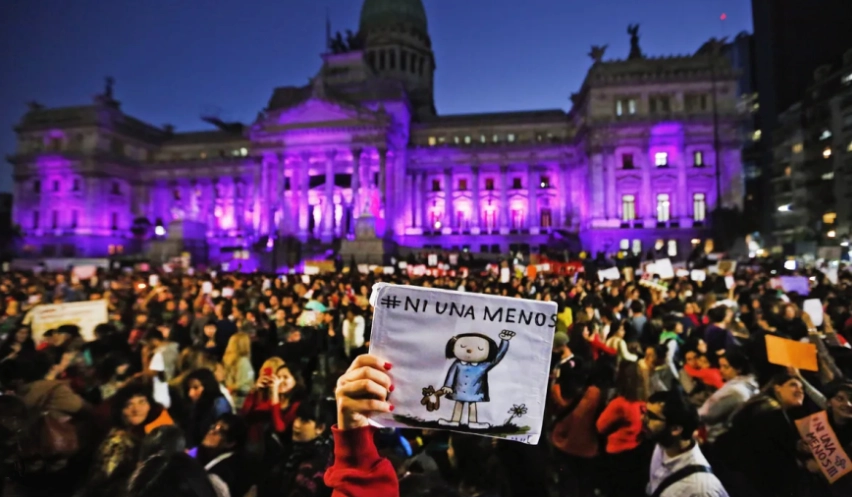Coauthor Michele Bravos
In 2023, we have witnessed an increasing debate about misogyny and the spread of masculinist discourse on the Brazilian internet. Masculinist groups, that is, boys and men who belittle and hate women based on misogynistic logic, have conquered spaces on YouTube channels, online gaming platforms, messaging application groups, forums, and blogs with a discourse marked by resentment.
It is clear that resentment is what unites not only misogynist groups but the far right as a whole. Discontent at the advancement of women’s rights, LGBTQIA+ rights, and the rights of black men and women, for example, organizes these people into violent revolt because, for a misogynist, these advances bring with them a sense of regression in men’s rights and a reduction in their masculinity.
For misogynist groups, women are the great enemies of society and must be returned to private spaces of subjugation. For them, women are exploited, manipulative, self-serving and deserve all possible punishments. The hatred extends to women on the extreme right, a common policy of misogynist groups. They are the “conservatives” who do not deserve to be in positions of power, even if they are a tool to spread sexist discourse.
Driven by these ideas in a virtual environment that encourages misogyny instead of curbing it, boys and men already desensitized — and therefore more vulnerable to violent extremist discourses — find themselves with virtual communities that harbor their resentment, as well as their feelings of not belonging, rejection and indignation towards institutions. Within the fabric of these masculinist groups are distorted conceptions of gender and sexuality, essential components for understanding an individual’s identity and, therefore, so present in the discourses of radicalization.
In the virtual environment, for example, there are communities of incels (involuntary celibates), boys, and men who feel sentimentally rejected for not conforming to a social norm. For them, there is a rule that governs a supposed “sexual market”, which describes the attraction of relationships between men and women. The rule, known as “80/20,” assumes that 80% of women are only attracted to the 20% of men considered socially superior. This 20% are the “alpha” men and the other 80% are the “beta” men.
Thus, what was once concepts used by masculinists have become movements, such as red pill and black pill. To be “redpilled” meant to wake up to the truth, in reference to the movie “Matrix” when the character Neo has the choice of taking the blue pill and remaining ignorant or choosing the red pill and finally knowing the whole truth. For these groups, the truth is that society is dominated by women, who have an advantage over men. The black pill, on the other hand, represents a more fatalistic approach, believing that there is no way to change society and that they are destined for exclusion, so they give up romantic relationships with women and often contemplate suicide.
It is in this context that the commercialization of misogyny through the sale of courses on “how to conquer a woman”, “how to be a successful man” and “how to attract the right woman” should sound a warning. At first glance, they may not pose much risk, but they are a gateway — now explicit and legitimized — to a process of radicalization, as they are permeated with incitement to the subordination of women — which in the future leads to the discrimination of other collectives — in a virtual environment that operates as an ally of misogyny and all kinds of hatreds.
From online to offline
It is not possible to claim that all members of an online masculinist group, who possibly express discrimination in the virtual environment, will practice violence in the offline world. However, when they join these groups, their members have the feeling of rejection — common in their trajectories — mobilized to hate minority groups, as well as being exposed to an idolization of those individuals who once “rebelled against institutions/the system” and carried out an offline attack (most of the time against schools).
The Suzano case in the city of São Paulo in 2019, when two youths attacked a school leaving 8 dead and eleven injured, is an example of this connection. There are indications that one of the perpetrators sought information on an incel forum to plan the attack.
Researcher Mariana Valente, author of the book Misoginia na Internet (Misogyny on the Internet), reminds us of the importance of perceiving online and offline environments as a continuum of each other. This helps to understand the tangled history of resentful boys and men who, in the process of radicalization toward violent extremism, are incited to transfer their hatred from online to offline, which will then reverberate online, feeding back into the violence.
Dispute over online space
It is not possible to say whether there are “losers” or “winners” in cyberactivism. What is at stake is the dispute over the narrative and the spaces of debate and power. This dispute involves the production of content and news, which reach our hands in a matter of seconds, many of which are configured as fake news, thus characterizing what we call “post-truth”.
In this context, disputes continue to increase between the search for greater rights for people historically in a subaltern position and violated groups and a neoliberal and radicalized offensive that hates women, LGBTQIA+ people, and people of color and does not care about the high numbers of femicides, LGBTQIA+ phobia, and racism.
Therefore, it is necessary to formulate strategies for the prevention of radicalization, and public policies transversal to education and social assistance, without fear of talking about gender equality and other possible masculinities, away from a pattern that is expressed through the oppression of the other. We must also take a closer look at what young people are looking for on social networks, proposing alternatives that steer them away from the path of radicalization. In addition, adults must be included in the debate so that they can reflect on their role in the construction of a non-resentful society.
*This text is part of the project (Re)connecting: bringing people together to overcome violence in schools, carried out by the Aurora Institute, with the institutional support of L21. To support the initiative, visit: https://bit.ly/projeto-reconectar
Michele Bravos is the Executive Director of the Aurora Institute for Human Rights Education. Master in Human Rights and Public Policies by the Pontifical Catholic University of Paraná (PUCPR).













